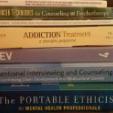-
Posts
1,179 -
Joined
-
Last visited
-
Days Won
18
Everything posted by TripWillis
-

Fall 2012ers: How are y'all feeling?
TripWillis replied to bdon19's topic in Literature, and Rhetoric and Composition
I'm feeling good! It's good to hear from you guys. I'm teaching two classes this year with two different preps, which is a major time-suck, but I get to teach literature for the first time, which is exciting. I scored a peer-reviewed article pub in the offseason and I have another under review. Turning in a book review today. Trying to stay as busy as I can on the publishing front. I'm tired, but in a really good way. My lingering doubts only come when my bank account is empty. -

safety schools for Victorianists
TripWillis replied to pereb3's topic in Literature, and Rhetoric and Composition
University of Phoenix. -

Where is everyone?
TripWillis replied to aGiRlCalLeDApPlE's topic in Literature, and Rhetoric and Composition
1) Congrats! 2) Sorry to say the exploitation doesn't end when you're a grad-fellow; you just feel slightly more valued by the university. -
CUNY Graduate Center I think has Matthew Gold. I also think their DH program goes between English and Urban Ed, for the most part.
-

Final Decision Thread 2013
TripWillis replied to Datatape's topic in Literature, and Rhetoric and Composition
I think you made the right decision. -

Final Decision Thread 2013
TripWillis replied to Datatape's topic in Literature, and Rhetoric and Composition
Yes, if it comes through, you have to take Maryland's offer. There isn't any doubt. -

Final Decision Thread 2013
TripWillis replied to Datatape's topic in Literature, and Rhetoric and Composition
I think it's a difficult decision; they're both wonderful programs. All things being equal, choose the place with the faculty you most want to work with. -

what is "hot" in English today?
TripWillis replied to Taco Superior's topic in Literature, and Rhetoric and Composition
I don't know how long it lasts. -

what is "hot" in English today?
TripWillis replied to Taco Superior's topic in Literature, and Rhetoric and Composition
Exactly. Can we start a petition to ban Harold Bloom and his multiple gradcafe accounts? -

what is "hot" in English today?
TripWillis replied to Taco Superior's topic in Literature, and Rhetoric and Composition
I think my favorite of all time was "New York's hottest new club is '...KEVIN?...' located in an abandoned warehouse on..." -

what is "hot" in English today?
TripWillis replied to Taco Superior's topic in Literature, and Rhetoric and Composition
1) "Which is another way of saying it is a specific permutation of general postmodernist theory. Which is interesting, because everyone working in X Studies is always quite fond of telling me that postmodernism is dead." -- Well, I will apparently be the first person working in x studies to tell you that all those "dead" theories are actually residual, a la basically every sub-field of inquiry since 1920 and WAY before that, too. 2) "We have this thing in English..." -- who is "we?" Presumably you and fishbucket? "...where actual thinkers, artists, or scholars come to a certain topic as a matter of course, as something that they treat along the road of their philosophical or methodological development, as a means of funneling or actualizing specific patterns of their thought." Straw men, everywhere! Again, who are these hypothetical people who take theory and enclose it as dogma? I don't know them. You'll have to introduce me. I think you'll find that with people who take an interest in x studies or theory y that the process you describe is no different. I am interested in the genealogies of certain themes and ideas that I tend to privilege in my research; I find this approach works better for me than a strictly period-based approach. I assure you though that the cart does not come before the horse (no animal studies pun intended). 3) "I need neither animal studies nor posthumanism-in-literature to tell me about culture and enthnocentrism, relativity and the phenomenological human condition, transcendental philosophy and the episteme, because those ideas predate, preconfigure, and outstrip the bubble of scholarship to which you are appealing" -- What do you know about animal studies/posthumanism besides what you've read off of a wikipedia page? Further, it's not that anyone needs these categories, nor takes them to be metonymic for an entire field of inquiry -- they're just convenient discursive taxonomies and ways of theorizing how one might begin to talk about or operate on these issues. Apparently, this is the most offensive thing in the world to you, that people who are mutually interested in a topic might congregate around a field of inquiry and (gasp!) have events and teach classes and god forbid publish! THE HORROR. ENGLISH IS RUINED. 4) "serfs" -- Revealing. 5) "in short, instead of developing scholars capable of living up to literature, we invent some little nook wherein we get to talk about animals in Victorian literature or what could possibly be gay in Dante: a theology, and turn our discipline into category bingo, into the work of finding X in Y, where the instances of those variables are deified" -- I think you're misunderstanding how theory works, and again, I have no idea what graduate level scholars you're talking about because I've never met them. Do you also have a problem with studying themes in literature? Edit: Little known and unrelated fact -- Foucault anticipated and welcomed posthumanist discourse in 1966's The Order of Things. It's an interesting path of influence; it's not at all without precedent or rigor. -

what is "hot" in English today?
TripWillis replied to Taco Superior's topic in Literature, and Rhetoric and Composition
But would you two be okay on your own like that? Just going to say it again -- the people who are "critiquing" posthumanism and animal studies in this thread have never read any of it and have no idea what it really is. -

what is "hot" in English today?
TripWillis replied to Taco Superior's topic in Literature, and Rhetoric and Composition
In this case I sense you just don't know very much about animal studies and posthumanism, especially considering that asleepawake has already acknowledged one of your primary critiques (of something you obviously know nothing about) and you read right through it. This is either cognitive dissonance or you are a troll. Humanism is also people talking for other people (see like everything ever written by Spivak for instance -- the fucking double bind!). Does that invalidate humanism? Is humanism a flawed methodology? Are you a troll? Edit: Everything is representation. Get over it. -

what is "hot" in English today?
TripWillis replied to Taco Superior's topic in Literature, and Rhetoric and Composition
OMG thank you. -

Final Decision Thread 2013
TripWillis replied to Datatape's topic in Literature, and Rhetoric and Composition
Welcome! -
1) 2) 3) What does this have to do with the conversation besides trololololololooooooooooooooooo? Another Don't Hate Classic ©.
-
Scratching my head here. I now understand that you meant contemporary pop culture, but now it seems you're saying that things can't be canonical until 100 years passes. There are things written within the last 5 years, pop culture texts, in fact, that are already canonical, some of which we like and some we don't. Edit: I'm done here, btw. Another time... the thread is drifting away from my initial point of interest.
-
I think a lot of pop culture already is canonical (Mark Twain's novels, Shakespeare's plays, Uncle Tom's Cabin). I'm not sure I feel comfortable being as absolute about this.
-
I like DH's potential, don't get me wrong, but to what end is it doing what you described? And also, I'm wary about why certain people like it -- oo, numbers! At the last DH lecture I went to, a professor had derived a statistical method to test Jameson's assertion that most major literature is now set in the future or past rather than the present. He found via statistics that Jameson was only sort of right. Afterward, I asked him, politely, what the point of his project was and he sort of sheepishly smiled and said, "I'm not sure. This is my first digital humanities-type project." I guess I'm puzzled about the exigency of some DH projects -- what's Henry Adams' term? Inert facts? If you can point out some DH work that has done more to challenge our methods, I'd love to hear about it. I guess I've had a bad experience with it so far. Then again, most new stuff stumbles out of the gate in praxis. Maybe I should be more patient.
-
I don't think we're talking past each other quite yet. I'm just still not sure I understand you. I looked for the Rupert Pupkin post that you said explains this process, but couldn't find it. If all you're saying is that we need to pay attention to aesthetics, I agree with you and we can be past this point. I just didn't get this idea of partitioning them off or using them as some kind of gatekeeping tool in determining the object of inquiry. I'm just not sure that's possible without divorcing oneself's inquiry from the analyses of material critique, which I don't think is possible in the first place. We're always already in hegemony. Re: cognitive/evolutionary -- in a perfect world, I'd be all about these, but I've heard and a read a few papers in the past year written in this vein that left me feeling dirty (unchecked and unreflective eugenicism and gender essentialism were involved). Cognitive/evolutionary, because it is influenced by the epistemes of science qua science, does not promote a more valid truth, but I think are best as reflections on their own methods, as with any other form of analysis. They tell us some of the story, but not all of it. We have to get away from this "lens" model of criticism. We also have to put methods under the microscope as texts themselves. I'm hoping you can help with this (also, I think science and philosophy are socio-cultural; as such, beware motivation, dogma, and demagoguery. We can't be led so easily by textual authority, or our jobs are obsolete). Re: Twilight -- you aren't going to like me saying this, but it's too late; Twilight is already in the canon, as are a great deal of dime novels and dramas through the history of literature. I don't like those books, and I'm not interested in them, but we're already responding to them via our suppression of them, and thus they are either on the margins of the canon or are fragmented and interspersed through the web-like shape of the canon (draw a dotted line between Stoker and Myers). The canon is a lot more organic and hegemonic than most of us are willing to admit because damnit we're supposed to be in charge! But, alas... teen vampire novels. The way I see it, 50 years from now, Twilight will probably only be talked about as being a mass culture fascination that influenced other writers, the way we talk about Melville and Hawthorne in light of 19th century dime temperance/vice novels. People still work on those novels because it helps them better understand Melville and Hawthorne. So, those books aren't at the center, certainly, but they're somewhere. Let's back up and look at the canon the way Derrida looks at the archive. The archive involves impression and selection. It often involves depositories. But there are always radical remainders and present absences in the depositories. Anything we impress or select is a violence to the other. As such, those suppressions are involved in the act of archiving. When we make the decision to exclude Twilight, its being, style, form, etc. can be traced to everything we include.




